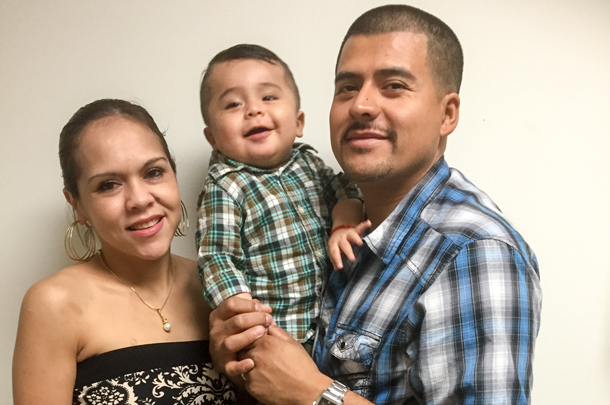The successful pancreas-kidney transplant that Eidalia Marquez Vazquez had a few years ago at Keck Medicine of USC meant that she no longer needed to constantly monitor and administer insulin as a Type 1 diabetic. But there was another wish she hoped could still come true — she wanted to be a mother.
“They told me there are risks and possible complications, but I always wanted to get pregnant. I had faith,” said Marquez, 32, a Las Vegas resident who this year celebrated the first birthday of her son, Jesus.
To ensure the best chance of a successful pregnancy without leading to rejection of the transplanted organs, the kidney-pancreas post-transplant team at Keck Medical Center of USC had to plan carefully in advance, adjusting Marquez’ medications and scheduling frequent checkups despite the distance from Marquez’ home.
“Unlike a kidney transplant that has been done alone, diagnosing a rejection on a pancreas transplant is a bit harder,” said Yasir A. Qazi, MD, medical director of the kidney-pancreas transplant program and associate professor of clinical medicine at the Keck School of Medicine of USC.
Not only is it difficult for recipients of this type of transplant, known as SPKT, to conceive and deliver a healthy baby, they face additional risks. Complications can include failure or rejection of the transplanted organ(s), deterioration in maternal renal and pancreas function, and increased risks of maternal illness or disease, maternal death, miscarriage, preterm birth, fetal malformations, low birth weight, hypertension, preeclampsia and infection.
Qazi explained that SPKT surgeries are rare, usually only offered to candidates with kidney failure from Type 1 diabetes. Only 709 were done nationwide in 2014, making up 2.4 percent of all transplants in the United States for that year. Since 2002, a total of 43 kidney-pancreas transplants have been performed at Keck Medicine of USC, one of the few centers in the world that also considers kidney-pancreas transplants for certain Type 2 diabetics with insulin dependency. There’s an even lower rate of successful pregnancies for these patients — research from Osaka University indicated only 77 pregnancies worldwide for 43 SPKT patients as of 2011.
To facilitate pregnancy, the team changed one of Marquez’ immunosuppressants and adjusted doses to reduce negative effects to fetal growth and development, while still maintaining good function of her transplanted organs. In addition to follow-ups by a local high-risk OB-GYN in Las Vegas, Marquez and her husband made monthly trips to Los Angeles throughout her pregnancy and after delivery for monitoring by the USC team, which conducted lab tests and ultrasound procedures.
“They had to come all the way from Vegas, which made it even harder because it wasn’t easy to have them get in a car while pregnant and have them come all the way over here. I was always worried about the safety of the entire family driving back and forth,” Qazi said.
“Dr. Qazi was very involved in my whole pregnancy, would call me, and that’s something that I recall very well,” Marquez noted.
Fast-forward to early October 2015, when Marquez, accompanied by her husband and little Jesus, made another visit to Los Angeles for a checkup. Numerous staff members greeted the family, expressing their disbelief at how much the boy had grown since their last visit in March 2015.
“I’m thankful to God, the outcome of the pregnancy, the transplant; I’m very thankful to the doctors here. I’ve had a lot of contact with a lot of physicians, but it doesn’t compare to the USC physicians and staff, the hospital and everyone overall,” Marquez said.
Jesus and his mother are both thriving and in good health. After an all clear from Qazi, the Marquez family won’t need to make the drive again to Los Angeles until next year.
In addition to Qazi, the post-transplant team includes Miroslaw Smogorzewski, MD, transplant nephrologist, director of the clinical nephrology teaching program and professor of medicine; Chong Parke, MD, transplant nephrologist and assistant professor of clinical medicine; Kristina Lee, RN, Bich Lieu Duong, RN, and Lorena Aguirre, RN, transplant coordinators; Kiran Dhanireddy, MD, surgical director and assistant professor of clinical surgery; Rosalina Sanchez, LVN; and Inez Castanon, scheduling coordinator.
— Margaret Trtryan


